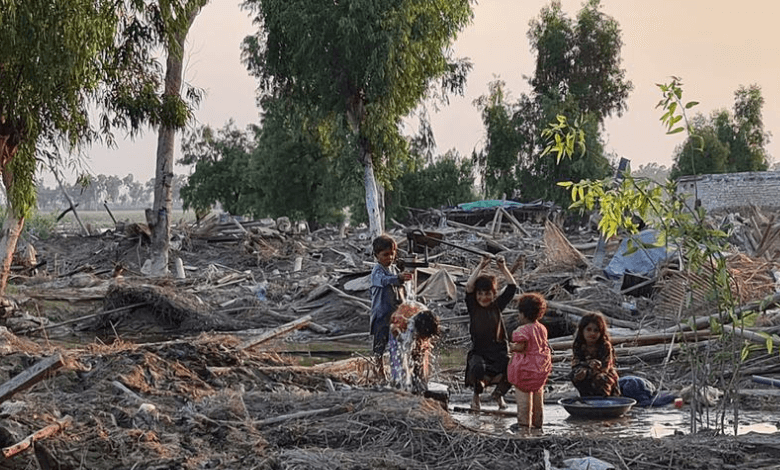Climate Crisis: Catastrophe Beyond Imagination

Greece, the cradle of Western civilization, was devastated this past summer by the combined forces of the primordial era. Numerous islands in the Mediterranean were destroyed by fire, water, and air, leaving a path of debris in their wake. Heat waves brought to the island by the sun god Helios, whose statue in Rhodes was one of the Seven Wonders of the Ancient World, caused hundreds of wildfires. According to Reuters, pine forests in coastal Alexandroupolis were “reduced to blackened, skeletal bark,” while fires in the Dadia forest, which is home to a magnificent nature sanctuary, burned 281 square miles, or an area about the size of New York City.
Tens of thousands of residents and visitors alike had to be evacuated throughout Greece, resulting in terrifying scenes of mothers carrying whatever supplies they could manage and fathers holding their children on their backs. Whole families are uprooted by climate change, not by conflict or bloodshed.
Just a few weeks after the fires, in September, the deluge occurred. Storms pounded Greece, Bulgaria, and Turkey, causing enormous floods. Some areas recorded record rainfall, up to one estimate of a season’s worth in a single day. The flooding of Derna on Libya’s Mediterranean coast served as the crescendo, at least for the time being. When the city’s aging dams were overrun by rain, entire neighborhoods were swept into the sea. There have been 11,300 confirmed deaths there, and 10,000 people are still missing.
Also Read: What Hurdles Saudi Arabia May Encounter Amid Climate Change?
Pakistan, and the alleged “super flood” that it experienced a year before this bombardment in and around Greece. The Himalayas, Karakoram, and Hindu Kush mountain ranges encircle the northern regions of Pakistan, which are home to the greatest concentration of glaciers on Earth outside of the polar regions, as more daring travelers will undoubtedly know. The scenery is incredibly stunning, resembling lunar visions of ice and rock surrounded by sharp peaks. However, as global temperatures rise, the melting of glaciers has created over 3,000 new lakes, putting the 7 million people downstream at risk of flooding.
Last year, Pakistan experienced an earlier and longer monsoon season with rainfall that was 780% above average due to the country’s extreme heat and melting glaciers. A third of the nation was submerged in August’s super flood, which was caused by the relentless rains. UNICEF reports that half of the 33 million people affected by the flood were children. Flooding covered millions of acres of agricultural land, killing livestock, ruining staple crops like tomatoes and chiles, and tainting sanitation systems. Thirteen and fifty thousand displaced families were living in flimsy tent cities, waiting for aid that came in spurts, while fourteen and a half million people needed emergency food assistance.
Pakistan’s efforts to recover from its disaster have been hampered by another extremely strong monsoon season this year, despite the attention being drawn to the tragedies in the Mediterranean. A 30-year record for rainfall in Lahore was broken in July by “incessant showers.” Nearly 200 people lost their lives in late July due to flash floods and landslides, the majority of which occurred in Baluchistan’s impoverished, mountainous areas. People are electrocuted by fallen power lines or crushed as buildings collapse in such conditions, in addition to drowning.
There was an all-time high temperature of 126 degrees Fahrenheit in China, and many other countries experienced extreme heat. August and September saw the breaking of similar records, indicating that “hottest ever” may become the new normal. Four months of severe weather caused 150,000 people to be displaced and 18,000 people to die worldwide. For the billions of people who inhabit this planet, these ever-increasing milestones and ever-deadlier temperatures foretell accelerating horrors.
All countries, wealthy or poor, will pay the same price for their goods and services, regardless of whether their leaders think that the situation is improving. We’ll withstand wildfires, extreme flooding, hurricanes, and tsunamis for as long as we can.
The recent catastrophic events in Greece, Pakistan, and around the world serve as glaring indicators of the impending climate crisis. The devastating wildfires in Greece, fueled by relentless heat waves, left entire regions scorched and forced tens of thousands of people to flee their homes. These disasters were quickly followed by catastrophic floods, with record-breaking rainfall in regions like Derna, Libya, leading to thousands of casualties and unprecedented destruction.



